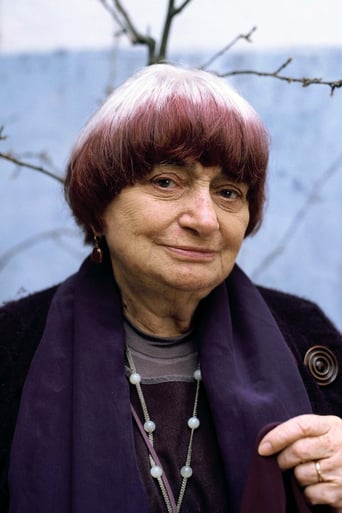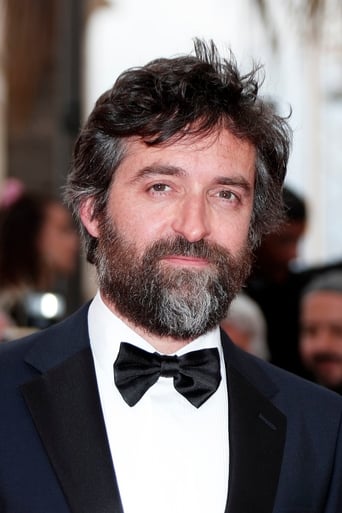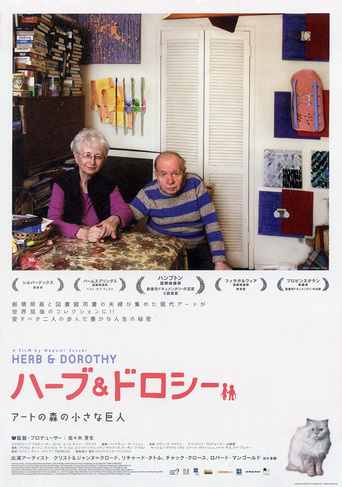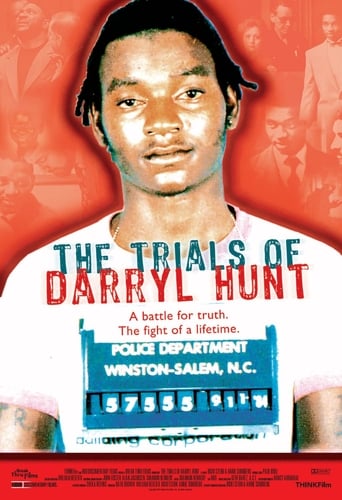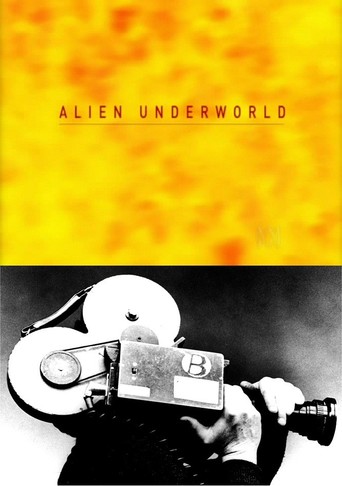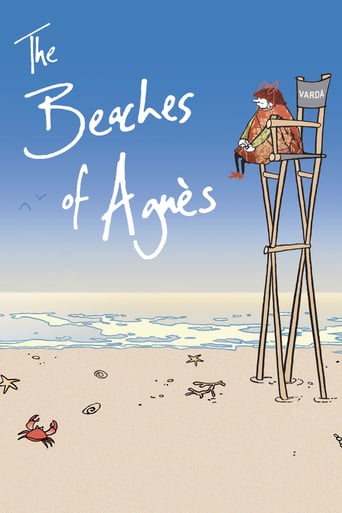
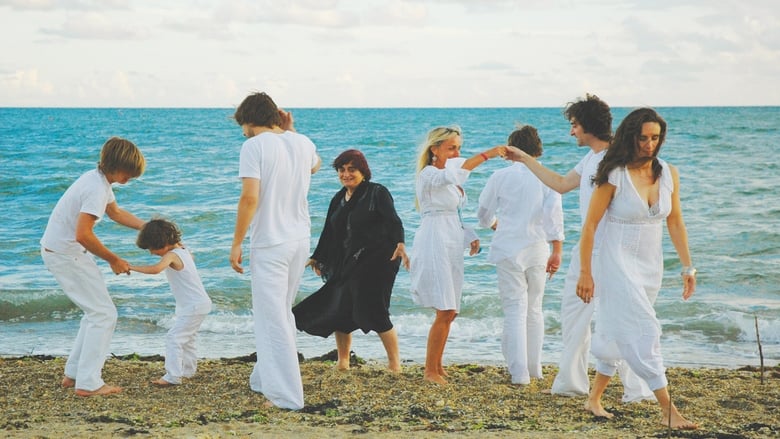
The Beaches of Agnès (2008)
Filmmaking icon Agnès Varda, the award-winning director regarded by many as the grandmother of the French new wave, turns the camera on herself with this unique autobiographical documentary. Composed of film excerpts and elaborate dramatic re-creations, Varda's self-portrait recounts the highs and lows of her professional career, the many friendships that affected her life and her longtime marriage to cinematic giant Jacques Demy.
Watch Trailer
Cast
Similar titles

Reviews
if their story seems completely bonkers, almost like a feverish work of fiction, you ain't heard nothing yet.
The film may be flawed, but its message is not.
Watching it is like watching the spectacle of a class clown at their best: you laugh at their jokes, instigate their defiance, and "ooooh" when they get in trouble.
An old-fashioned movie made with new-fashioned finesse.
So I finally arrive for the last leg of my journey with Varda in this self portrait. I will rest here for the time being with the beautiful introspection of it; not because she has stopped working, she hasn't, but this permits an appreciation of everything she strives to live for. For newcomers it will be a good place to start knowing her and they can deepen each chapter by going back to her earlier travels.Introspection is the wrong word actually. Varda doesn't keep things internalized, I don't get the sense of anything hidden or dimly seen. For her it is all readily available, it is all externalized and offered up to us like we are guests in her house on an afternoon and she just waves us in smiling. I get the sense of a woman who has traveled far and seen amazing things and can't wait to share it all with a giddy, sometimes shy, excitement.This isn't the first time she is reflecting on herself of course, many of her works are self portraits on the side or inspired by real life. We learn for example that Daguerrotypes she filmed around her neighborhood because she was pregnant at the time and had to stay at home. But how does she present herself here, what images of her? Varda as grandmotherly raconteur, as young girl overcoming her shyness with men, as spirited woman who protested injustice, as wife and soulmate and explorer.As for stories, she has been all over and has plenty. Traveled to China and Cuba in her twenties and came back with images of revolution. Knew Godard and speaks about her filmmaking start via Resnais. She was in Oakland in '68 to film the Panthers. Knew Jim Morrison. Partied with Warhol's circle in LA. Protested feminism with Delphine Seyrig in the streets. Marker is in the film, speaking from behind an image. These and more.Saying that she shares it all in the open isn't the whole truth either; truth is knowing how to sculpt it after all. You might appreciate how eloquently she speaks about discovering sex in Corsica one summer by not speaking about it. How gracefully she speaks about her marriage, sketching only the air around unhappiness (as all marriages know) by a small gesture; yes, she was the woman in Documenteur. She is one of those beautiful souls who know how to move towards things, how to move back, how to see and from what distance. The most lasting impression however is of a woman who glides through lives she recalls and summons to her in the beach of memory, and this is Varda herself in the actual film moving through images, photos of childhood, mirrors, a visit to her childhood home yields an impromptu discussion about model trains, clips from old films, enactments, narrations about these. But moves with an unfettered soul. She opens the film with "I'm playing the role of a little old lady, telling her life story". Be like her, play the role of someone who happens to be the person you have come to be; no more is necessary.For near the end she reserves a small gem that carries the wisdom of entire lives, there's more to this one line than in entire careers. Prior to it, we have seen a woman who has known heartbreak enough, pacing alone in the house of images (the place with strips of film hanging from walls). Now her family, kids and grandkids, are dancing nearby. Watching them she muses that they're her happiness, she doesn't know if she knows them or understands them, she just goes towards them. Something to meditate upon.
Agnès Varda presented us in this autobiographical movie with her memories of a life devoted to the cinema and not only. She does that in powerful and beautiful images supported by a brilliant, witty and sensitive commentary. In this movie we can see references to several of some of the best Varda's films such as La Pointe Courte, Cléo de 5 à 7 and Le Bonheur, with images, and to some of the greatest and more important figures of French cinema such as her husband Jacques Demy to begin with and also Godard, Catherine Deneuve, Michel Piccoli, Jane Birkin and others. The cut is very intelligent and effective in visual terms combining the present and the past sometimes in simultaneous images with a special effect here and there. A masterpiece indeed.
In a revealing and playful mood, filmmaker Agnes Varda narrates her own filmed autobiography in The Beaches of Agnes. The film begins with Varda, now 82, setting up mirrors on the beach with the sounds of one of her mother's favorite works, Schubert's Unfinished Symphony in the background Though she asserts that "Today, I'm playing a little old lady, talkative and plump," she looks anything like a little old lady. The film re-creates her life with childhood memories that take her back to homes she knew as a child in Brussels and the city of Sete where she made her first film at the age of 26.The film is not a dry documentary, filled with reminiscences of people we never heard of. It is a work of art in itself, a celebration not only of her life, but of all life. Along the way, Varda takes us to Los Angeles (one of her favorite cities in which she lived) where she talks about and shows photos of her former husband Jacques Demy, who she announces died of AIDS in 1990, Jane Birkin, Chris Marker (dressed as a cartoon cat) and even poet, singer Jim Morrison. Varda began as a photographer and we see an example of her photos from a long time ago. While the film documents Varda's films beginning with her first Le Pointe Curé in 1956 to the present day and the first appearances on film of Gerald Depardieu, Phillipe Noiret, and Harrison Ford, she also discusses in detail and shows excerpts from her most popular films including Cléo from 5 to 7, Le Bonheur, Vagabond, The Gleaners and I, and her documentary tributes to her husband.Rather than an egoists attempt to enhance a reputation with big events in which she participated, the film looks at small things like the uniform she had to wear in Vichy France and a scene at an outdoor flea market where the director finds cardboard cutouts of herself and other filmmakers with their works listed on the back. But there is much more. With actors dramatizing important memories from her life, The Beaches of Agnes is filled with the people, including her two grown children, places and events, including her trips to Cuba and China that contributed to her personal growth and made her the lively and vibrant person she is today. She closes the documentary by saying, "I am alive, and I remember." While we are still alive, we will remember her.
"The Beaches of Agnes" is an autobiographical documentary done in a uniquely impressionistic style. The subject is Agnes Varda, the legendary French director who began her career in the 1950s and, who at the age of 80, shows that she is still a master of her art and craft. For not only does Varda provide the voice-over narration for the film, but she conceived and directed the project as well.Varda uses as her focal point the various beaches where she spent a great deal of her time growing up. It is to these places that she has brought a crew of filmmakers to shoot her delivering extended monologues on her life and to restage - often in a cleverly amusing and surrealistic style - memories and events that have remained with her throughout the years. When she has actual photos and file footage from the past, she is quick to use them, but when she doesn't, she turns to present-day re-creations to fill in the gaps. But all is not limited to the beach, for she frequently heads inland to retrace the steps of her life, visiting key locations along the way.She explores her childhood, when she lived much of the time on a houseboat; her teen years, when she was thoroughly ignorant of what a woman could do in the world and of the realities of man/woman relationships; her experiences during the War and the Occupation, when most French citizens "lived day to day;" her years studying art at the Ecole du Louvre; her first taste of freedom and independence when she stole off one night all on her own to Corsica; her time spent as a fisherman; her burgeoning fascination with photography; her marriage to fellow director and film-making inspiration, Jacques Demy; her role as mother and grandmother; her trips to Cuba and Southern California in the 1960s to capture in photos and on film the turbulent nature of that period; her fervent pro-feminist leanings that often found their way into her movies; and her eventual transition to film-making herself to become the only female figurehead of the French New Wave, an otherwise Young Boys' Club that included, in addition to Demy, Godard, Truffaut, Resnais, and various other cinematic masters.It is here that the movie turns to Varda's career as a filmmaker, as the artist herself discusses her inspirations, her key themes and concerns, and the logistical problems of the movie-making process itself. The movie provides us with a generous sampling of clips from not just her own movies but those of Demy as well.As she reflects back on her life, Varda addresses the issues of aging, memory, and personal loss (especially of her beloved Jacques, who died of AIDS in 1990). She views the sea as representative of permanence - and human beings and their foreshortened life spans as symbols of the universe at its most temporal. Through its mixing of the real with the surreal, the literal with the figurative, "The Beaches of Agnes" mirrors the hybrid nature of Varda's photographic and cinematic works themselves.But the movie is often at its most charming when it is content to simply BE, when some seemingly random image, person, event or thought comes along to capture Varda's complete and undivided attention - a testament to her astute powers of observation, to her complete and utter absorption in the moment, and to her ability to make art out of the raw materials of actual life.And isn't that what movie-making is really all about, after all?
